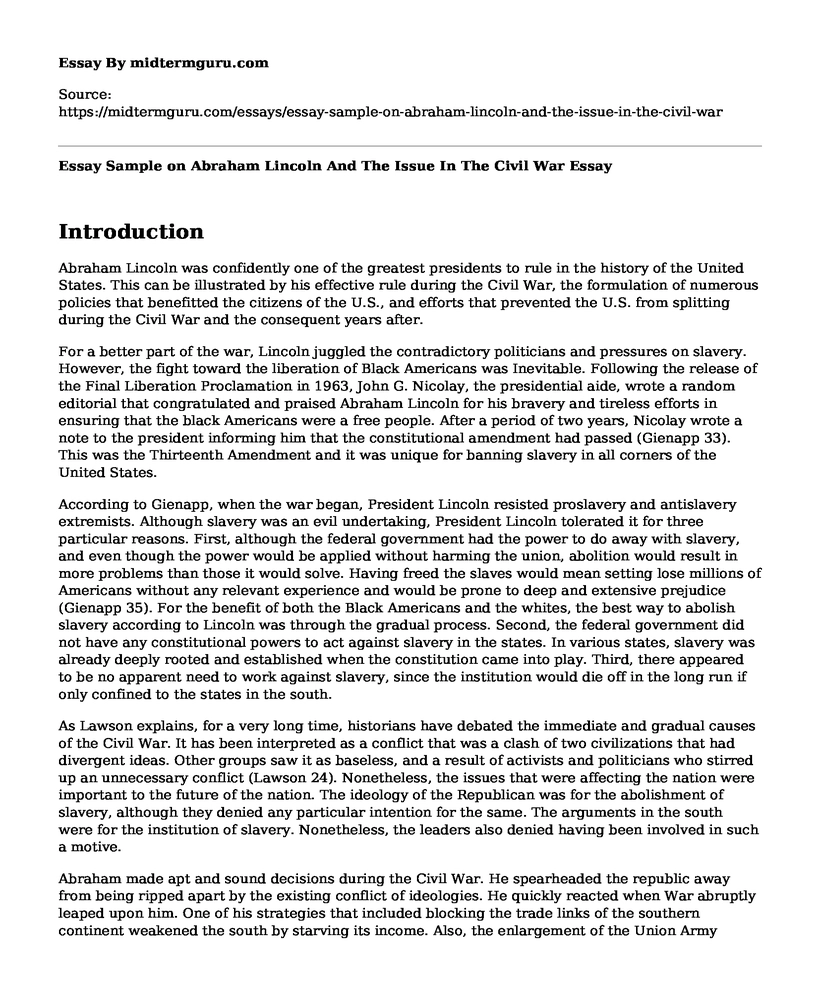Introduction
Abraham Lincoln was confidently one of the greatest presidents to rule in the history of the United States. This can be illustrated by his effective rule during the Civil War, the formulation of numerous policies that benefitted the citizens of the U.S., and efforts that prevented the U.S. from splitting during the Civil War and the consequent years after.
For a better part of the war, Lincoln juggled the contradictory politicians and pressures on slavery. However, the fight toward the liberation of Black Americans was Inevitable. Following the release of the Final Liberation Proclamation in 1963, John G. Nicolay, the presidential aide, wrote a random editorial that congratulated and praised Abraham Lincoln for his bravery and tireless efforts in ensuring that the black Americans were a free people. After a period of two years, Nicolay wrote a note to the president informing him that the constitutional amendment had passed (Gienapp 33). This was the Thirteenth Amendment and it was unique for banning slavery in all corners of the United States.
According to Gienapp, when the war began, President Lincoln resisted proslavery and antislavery extremists. Although slavery was an evil undertaking, President Lincoln tolerated it for three particular reasons. First, although the federal government had the power to do away with slavery, and even though the power would be applied without harming the union, abolition would result in more problems than those it would solve. Having freed the slaves would mean setting lose millions of Americans without any relevant experience and would be prone to deep and extensive prejudice (Gienapp 35). For the benefit of both the Black Americans and the whites, the best way to abolish slavery according to Lincoln was through the gradual process. Second, the federal government did not have any constitutional powers to act against slavery in the states. In various states, slavery was already deeply rooted and established when the constitution came into play. Third, there appeared to be no apparent need to work against slavery, since the institution would die off in the long run if only confined to the states in the south.
As Lawson explains, for a very long time, historians have debated the immediate and gradual causes of the Civil War. It has been interpreted as a conflict that was a clash of two civilizations that had divergent ideas. Other groups saw it as baseless, and a result of activists and politicians who stirred up an unnecessary conflict (Lawson 24). Nonetheless, the issues that were affecting the nation were important to the future of the nation. The ideology of the Republican was for the abolishment of slavery, although they denied any particular intention for the same. The arguments in the south were for the institution of slavery. Nonetheless, the leaders also denied having been involved in such a motive.
Abraham made apt and sound decisions during the Civil War. He spearheaded the republic away from being ripped apart by the existing conflict of ideologies. He quickly reacted when War abruptly leaped upon him. One of his strategies that included blocking the trade links of the southern continent weakened the south by starving its income. Also, the enlargement of the Union Army granted the North a powerful and authoritative edge over the south and was able to easily fight the Confederacy (Lawson 30). However, some of his actions appeared controversial: for instance, the suspension of the habeas corpus for various supporters of the Confederate who were extremely vocal in their support. This action, however, prevented unrest when there was a need for a united front to fight the Confederacy. During the period of the War, the president did not focus all his attention on the war, he, though nervously, came up with various policies that propelled the attainment if the prosperous and peaceful United States of today.
Work Cited
Gienapp, William E. "This Fiery Trial." The Speeches and Writings of Abraham (2002).
Lawson, Melinda. Patriot Fires: Forging a New American Nationalism in the Civil War North. University Press of Kansas, 2002.
Cite this page
Essay Sample on Abraham Lincoln And The Issue In The Civil War. (2022, Sep 15). Retrieved from https://midtermguru.com/essays/essay-sample-on-abraham-lincoln-and-the-issue-in-the-civil-war
If you are the original author of this essay and no longer wish to have it published on the midtermguru.com website, please click below to request its removal:
- Essay on Abbasid Imperial Style and Abbasid International Style
- Review of Roanoke the Abandoned Colony - Paper Example
- Economic Changes in Saudi Arabia and the Government 2030 Vision
- Essay on Administration of Solid Garbage in Urban Areas
- Paines Quest for Americas Independence in Common Sense - Essay Example
- The Great Depression and the Financial Recession of 2008 - Essay Sample
- Paris Climate Deal: Uniting Nations to Combat Climate Change - Essay Sample







